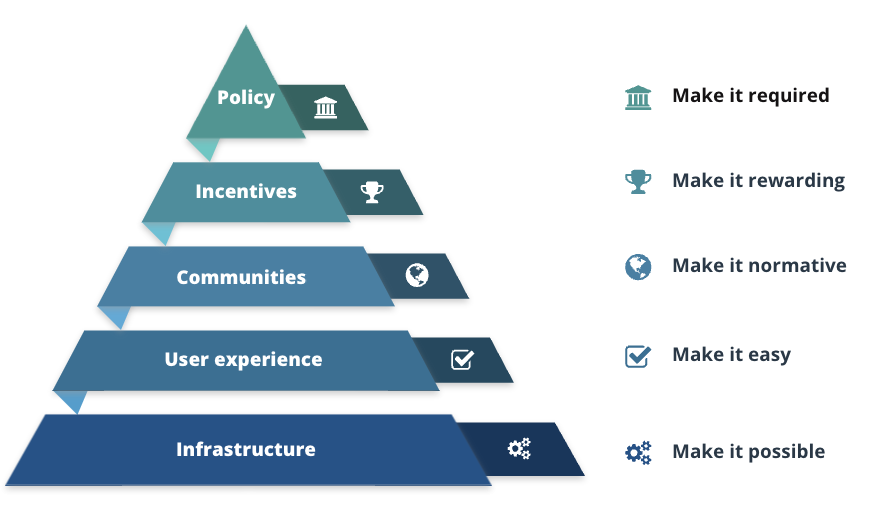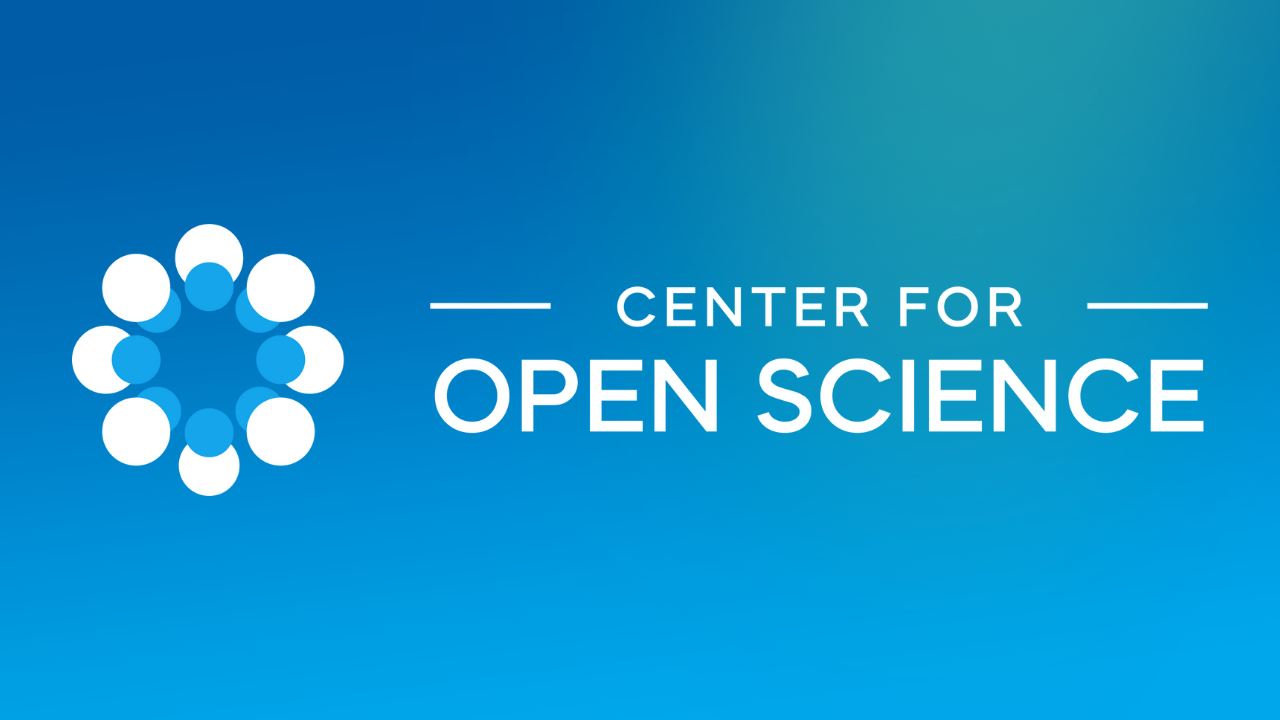This strategic plan is the culmination of a year-long review process that engaged many internal and external stakeholders to shape Center for Open Science’s (COS) priorities for the next three years. As part of a strong collaborative network, COS is well-positioned to enter its second decade with a strong foundation of infrastructure, community engagement, policy and practice frameworks, and research evidence to advance a sustainable, values-aligned research culture.
We look forward to working with you, our partners and advocates for culture change, and we thank you for your support, commitment to this work, and ongoing inspiration.
With contributions by COS and many other change agents, the open scholarship landscape is maturing from an early focus on accessibility of research outputs (open access, preprints, open data) to an appreciation of the need to improve research practices across the entire research lifecycle. For COS, open scholarship is an imperative for improving multiple interrelated aims for research: access, transparency, rigor, integrity, inclusion, and reproducibility. Increasing engagement by funders, policymakers, societies, publishers, and institutions sets the conditions for anticipating accelerated progress on the mission.
Nine Years of a Systems-Level Approach to Change
In nine years of existence, COS has made substantial progress toward making science open by default. Our theory of change involves:
- providing infrastructure (the Open Science Framework (OSF), and related interfaces, including preprints, collections, institutions, meetings, and registries) to make research rigor and transparency enhancing behaviors possible and easy;
- changing norms with community building, training, promoting visibility of open behaviors (Open Scholarship Survey for communities to assess their readiness for change and progress, badges to acknowledge open practices to make the new behaviors visible within communities, and internally developed training and supporting community-led education and knowledge sharing via the Open Scholarship Knowledge Base), and coordinating engagement and interventions by multiple stakeholders; and
- providing policy solutions for journals, funders, and institutions to change incentives toward open and rigorous research (TOP Guidelines and the normative intervention called TOP Factor to foster further adoption among stakeholders).
Read about some of our recent highlights and milestones in our 2021 Impact Report.
Strategic Plan
This strategic plan is the culmination of a year-long review process that engaged many internal and external stakeholders to shape COS’s priorities for the next three years. From this work emerged three strategic imperatives and eight priority initiatives to advance our mission.
Mission
To increase openness, integrity, and reproducibility of research in the service of accelerating acquisition of knowledge, solutions, and treatments
Strategy
To scale sustainable adoption of open behaviors by researchers, COS
- provides open infrastructure that makes it possible to do the behaviors,
- conducts user-centered product development to make it easy to do the behaviors,
- supports grassroots organizing to activate and train adopters and make their behavior visible to shift community norms toward the behaviors,
- offers solutions to journals, funders, and institutions to nudge incentives to make it desirable to do the behaviors, and
- provides and promotes a policy framework for stakeholders to make the behaviors required.

Effective policy implementation requires effective infrastructure for doing the behaviors, and community buy-in to treat the behaviors as good practice rather than administrative burdens. These five levels of intervention are highly interdependent, each necessary, none sufficient, and collectively comprise a systems-level approach to improving the research culture.
2022-2024 Strategic Imperatives
- Stakeholder Coordination and Engagement. COS will mature organization-wide partner and stakeholder coordination and engagement that is mission advancing and sustainability enhancing. Culture change requires collaboration, particularly in a decentralized and distributed system like science. COS’s theory of change presumes that piecemeal efforts will be insufficient to catalyze sustainable change. To advance the mission, COS must solve the coordination problem by aligning, connecting, and collaborating with multiple stakeholders and change agents across communities of practice.
- Scalable Culture Change. Second, science is a big community and COS is but one organization. In addition to partnering with mission-aligned organizations to strengthen the network of change agents, COS must advance scalable culture change strategies. COS can be more effective in collecting and using data to identify readiness for change and make good decisions about deployment of resources. COS can continuously improve inclusion of contributors to culture reform to ensure that strategies address the diversity of needs across the research community. COS can improve community engagement to ensure that everyone feels ownership of the reforms and tools supporting their community and practice. And, COS must continuously evaluate its interventions to capitalize on their strengths and address their weaknesses.
- Streamlining the Research Lifecycle. Third, COS provides infrastructure to make it possible for researchers to be more rigorous and transparent with their research. Adoption of new behaviors will be facilitated by improving the ease with which the supporting infrastructure integrates with researchers existing workflows. Supporting education and training will provide researchers with the capacity to make the most of the new behaviors. And, effective data management and user interface improvements will foster discovery, evaluation, and reuse by the rest of the research community to support assessment of credibility and accumulation of knowledge.
2022-2024 Priority Initiatives
- Relationship Management: Improve internal and external collaboration and management processes to engage partners and communities on the theory of change strategy.
- Supporting the Research Lifecycle: Mature OSF support for the whole research lifecycle with enhanced workflows to encourage comprehensive open, rigorous behavior by research producers, facilitate reporting to stakeholders, and improve discovery and reuse by consumers; galvanize collaborative governance, roadmap development, and sustainability for shared infrastructure with stakeholder communities.
- Scaling Stakeholder Change: Establish scalable approach to monitor and promote policy changes by funders and journals.
- Catalyzing Community: Create and foster self-sustaining metascience and open scholarship/reform communities.
- Theory-Testing: Evaluate culture change interventions and investigate whether the behaviors we advocate actually increase replicability, increase credibility, and accelerate discovery.
- Maturing Financial Sustainability: Advance current sustainability models (philanthropic funding and product earned revenue) and add earned revenue services model/s.
- Institutional Change: Explore assessment, intervention, and evaluation opportunities to improve institutional research cultures.
- Globalization: Extend support of the global research community to improve adaptability and relevance of our products, services, and engagement with diverse regional needs.
Looking Ahead
As part of a strong collaborative network, COS is well-positioned to enter its second decade with a strong foundation of infrastructure, community engagement, policy and practice frameworks, and research evidence to advance a sustainable, values-aligned research culture.
To review the full 2022-2024 Strategic Plan, including key objectives and measures for these core initiatives, visit https://osf.io/x2w9h/.
We look forward to working with you, our partners and advocates for culture change, and we thank you for your support, commitment to this work, and ongoing inspiration.



